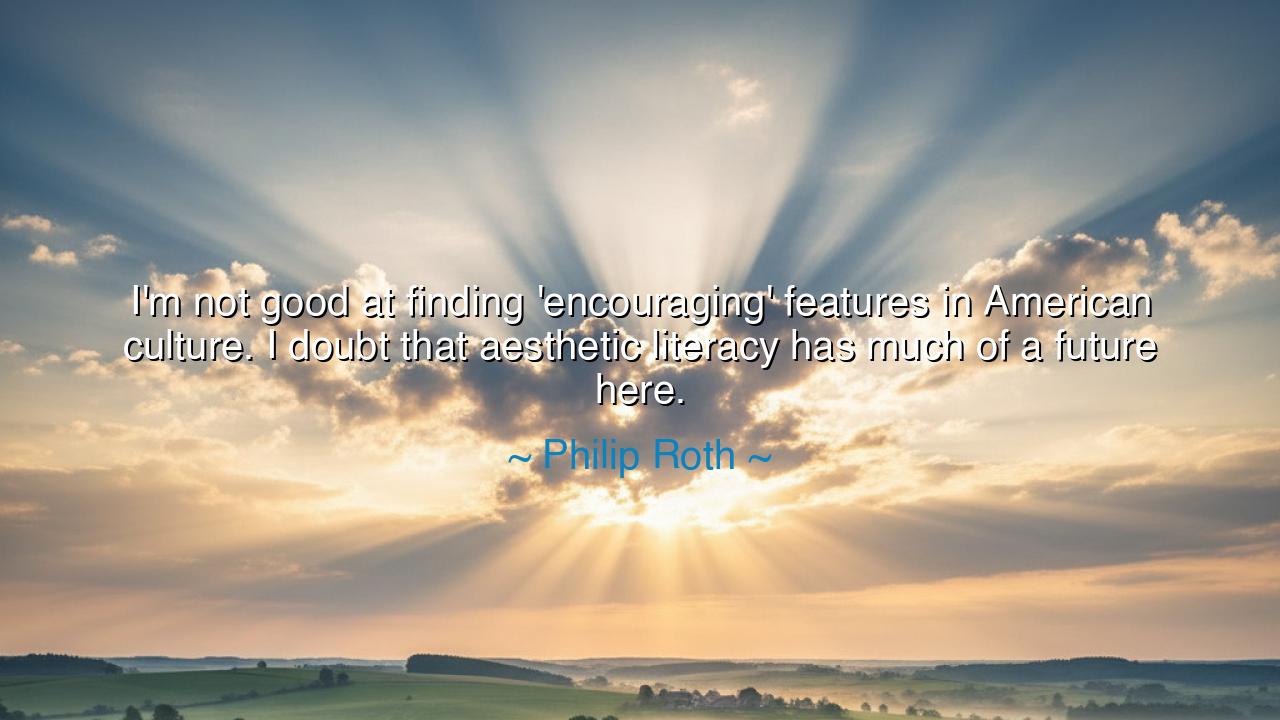
I'm not good at finding 'encouraging' features in American
I'm not good at finding 'encouraging' features in American culture. I doubt that aesthetic literacy has much of a future here.






The novelist Philip Roth, with his usual sharpness of mind and sorrowful clarity, once declared: “I’m not good at finding ‘encouraging’ features in American culture. I doubt that aesthetic literacy has much of a future here.” Beneath these words lies not cynicism, but lament — the grief of an artist watching the slow dimming of a sacred light. For Roth, who spent his life wrestling with the contradictions of the human heart and the dissonances of modern life, the decline of aesthetic literacy — the ability to perceive, appreciate, and be transformed by art — was not merely a cultural issue, but a spiritual one. His words are both warning and prophecy: that a civilization which forgets the language of beauty may one day forget what it means to be human.
To understand this saying, we must remember what aesthetic literacy truly means. It is not simply knowing the names of painters or the dates of books, but the cultivation of the inner eye, the sensibility that sees beyond surface into meaning. It is the ability to feel the tremor of truth in a symphony, to hear the silence between words in a poem, to recognize the sacred in the ordinary. Roth feared that in the loud machinery of modern America — the noise of commerce, speed, and endless distraction — this inner sensitivity was dying. The soil that once nourished the artist and the thinker was becoming barren, replaced by appetite without reflection, entertainment without elevation.
The origin of Roth’s concern lies in his lifelong relationship with culture itself. As one of America’s greatest writers, he was both its chronicler and its critic. His novels — fierce, ironic, and unflinching — dissected the anxieties of modern identity and the moral cost of ambition. He saw in his country both brilliance and blindness, energy and emptiness. By the end of his life, Roth observed that the very culture which had once celebrated art as essential — as a mirror for truth — had begun to relegate it to decoration. He feared that people no longer sought art to understand, but only to consume. And in this, he saw the shadow of a civilization growing restless but not wise, wealthy but not awake.
Such a lament is not new. The ancients, too, spoke of the peril of losing reverence for beauty and thought. The philosopher Plato, centuries before Roth, warned that when a people prefer spectacle to wisdom, their democracy begins to rot from within. He saw that beauty — true beauty — was a path to virtue, a mirror reflecting the harmony of the soul. Likewise, in the decline of Rome, poets like Juvenal wept as art gave way to indulgence and cheap distraction. Roth stands among these old voices, a modern prophet crying out that the temple of art is being replaced by the marketplace.
There is a story from history that reflects Roth’s lament — the burning of the Library of Alexandria. When the flames consumed that treasure of ancient knowledge, a great silence fell upon the world. Thousands of scrolls — poems, philosophies, discoveries — were lost forever. Yet the tragedy was not only the loss of words, but the loss of spirit — the collective will to preserve beauty and wisdom for its own sake. So too, Roth feared, might modern culture burn its own library — not with fire, but with indifference. When a society no longer teaches its children to read art, to see meaning beyond profit, it commits a quieter but equally devastating act of erasure.
Yet from this sadness, a lesson arises — one both urgent and eternal. If aesthetic literacy is dying, then it falls upon each of us to revive it, to become its guardians. To read deeply, not quickly. To look at a painting not as décor, but as dialogue. To listen to music not as background, but as revelation. To speak of art not as luxury, but as necessity. The soul that is trained to love beauty becomes incapable of cruelty, for it recognizes the divine pattern in all things. This is the wisdom the ancients lived by — and the wisdom Roth feared we were forgetting.
Therefore, dear listener, let us not surrender to the dullness of a world that rushes past wonder. Let us reclaim the lost art of attention, for attention is the seed of appreciation, and appreciation is the root of meaning. Teach your children to see, to feel, to question, to imagine. Guard your mind from the noise of triviality. Seek beauty not to own it, but to be transformed by it. For if aesthetic literacy dies, so too does empathy, depth, and the very soul of culture.
Let Philip Roth’s words stand as both warning and call to arms: a civilization that forgets the sacred language of art will lose its memory, its compassion, and its light. But if even a few remain — a few who still read, still listen, still wonder — then the torch will not go out. The future will still have beauty, and through it, humanity will find its way home again.






AAdministratorAdministrator
Welcome, honored guests. Please leave a comment, we will respond soon